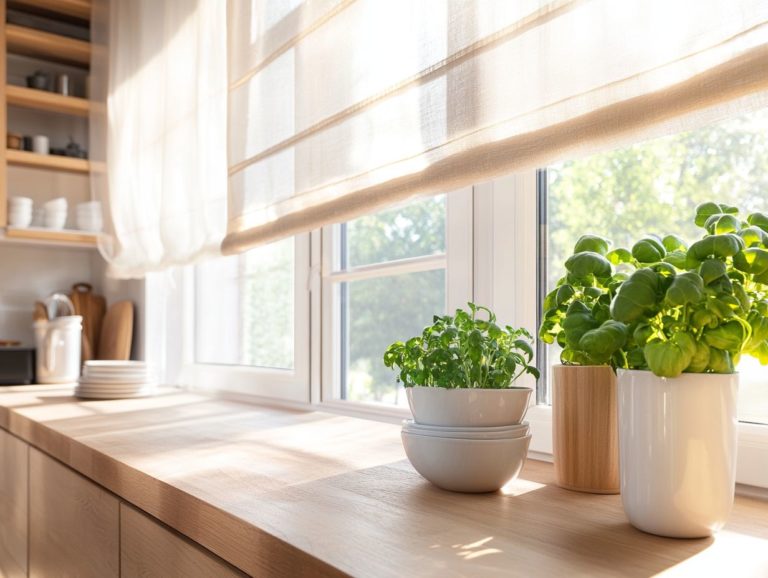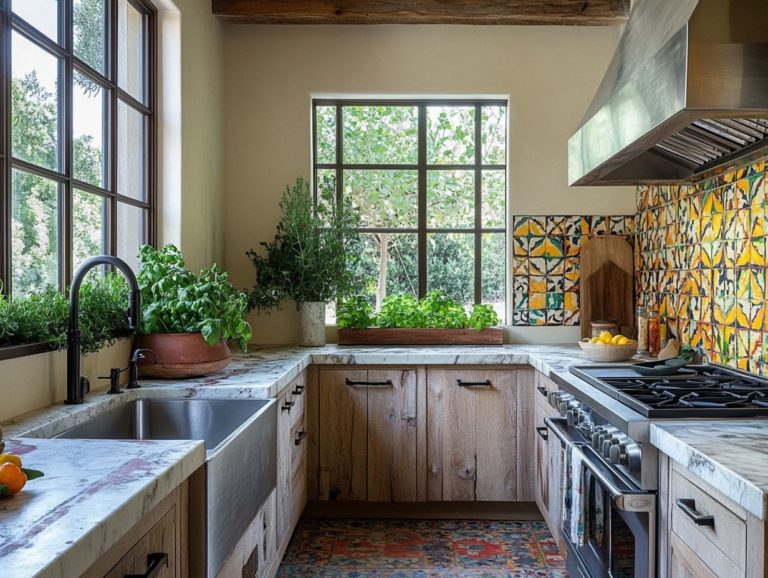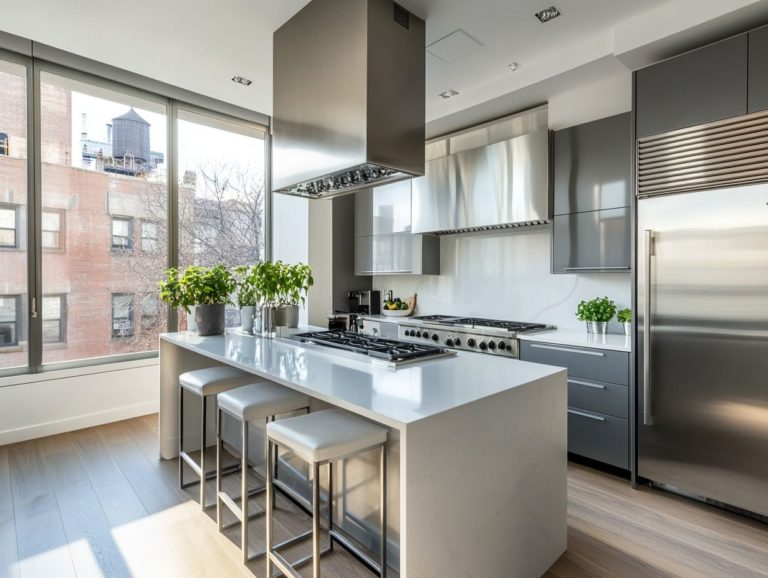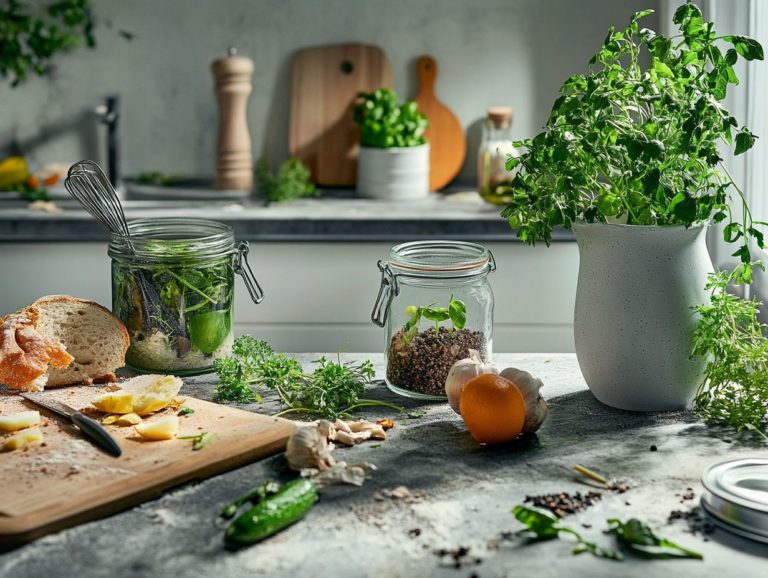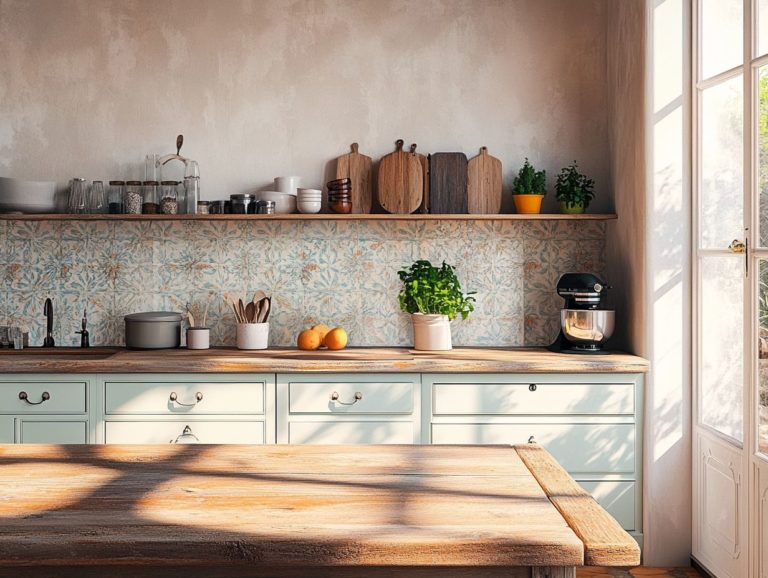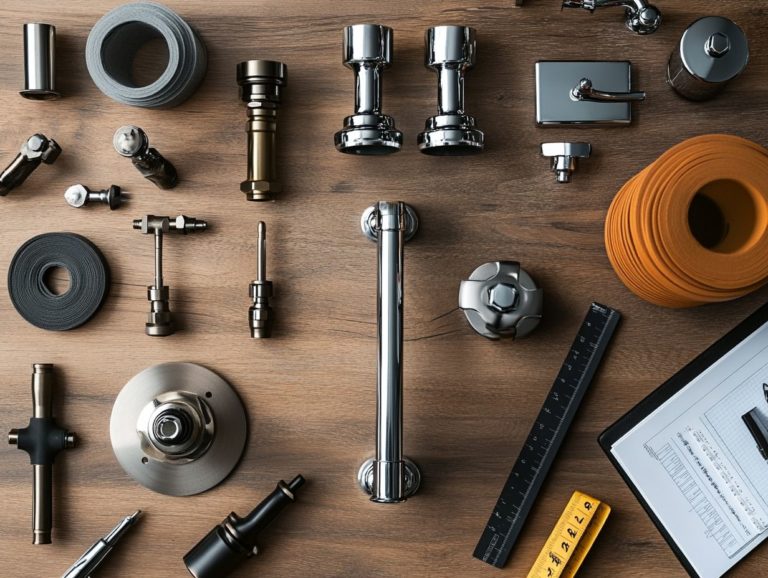Understanding Kitchen Material Maintenance Requirements
Maintaining your kitchen materials is crucial for both aesthetics and functionality. With a wide array of materials at play—from countertops to cabinets—each comes with its own set of unique maintenance requirements.
This guide will walk you through the different types of kitchen materials, effective cleaning techniques, and best practices for preventing damage. You’ll also find insights on common concerns like scratches and stains, along with advice on when it’s wise to enlist a professional’s help.
Give your kitchen the care it deserves, and watch it shine!
Contents
- Key Takeaways:
- Types of Kitchen Materials
- Cleaning and Maintenance Techniques
- Preventing Damage and Wear
- Addressing Common Issues
- Professional Maintenance Services
- Frequently Asked Questions
- What are the different types of kitchen materials?
- Why is it important to understand kitchen material maintenance requirements?
- What are some general maintenance tips for kitchen materials?
- How often should I clean my kitchen materials?
- What are some common maintenance issues with kitchen materials?
- What are some specific maintenance requirements for different types of kitchen materials?
Key Takeaways:
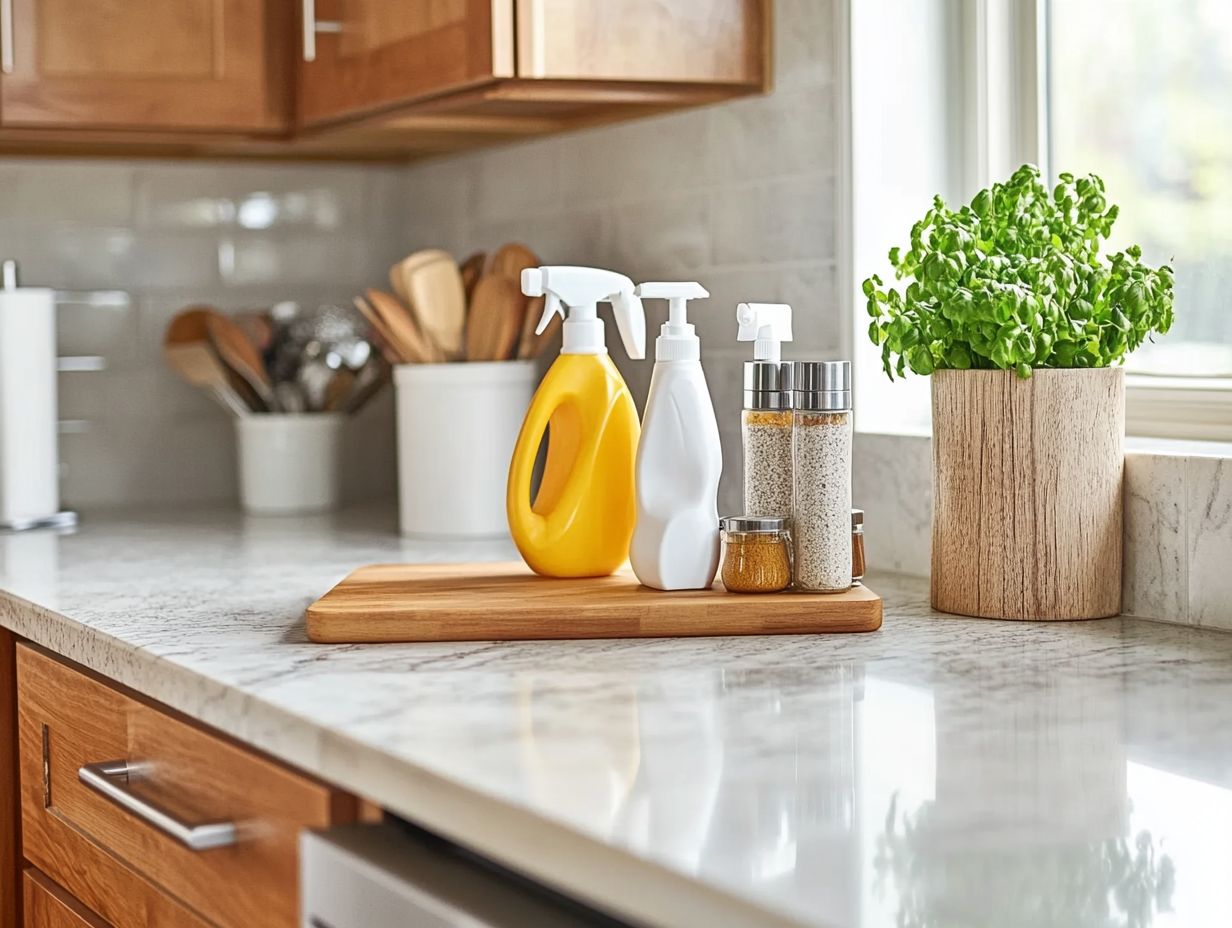
Regular maintenance is crucial for the longevity and functionality of kitchen materials.
Different types of kitchen materials require specific cleaning and maintenance techniques.
Taking preventive measures and addressing issues promptly can extend the lifespan of kitchen materials.
Why You Can’t Ignore Kitchen Maintenance!
Proper maintenance in your kitchen is essential for ensuring food safety, hygiene, and the longevity of your equipment. All of these factors significantly affect kitchen performance and compliance with health regulations like those established by the FDA (Food and Drug Administration) and FSA (Food Safety Authority).
This careful approach protects against health risks and enhances your establishment’s reputation. By implementing regular inspections, you can catch issues early, averting more significant complications down the road.
Regular cleaning and timely part replacements are key to extending the lifespan of your critical equipment. As a result, you’ll notice an improvement in the overall efficiency of your kitchen operations, leading to consistent meal quality and timely service.
By adhering to these maintenance protocols, you’re not just meeting safety standards; you’re also creating a safe and enjoyable dining experience for all your patrons.
Types of Kitchen Materials
The choice of kitchen materials is pivotal, impacting not only the design but also the overall functionality of your kitchen space. These materials influence everything from aesthetic allure to maintenance requirements and even food safety.
Selecting the right materials ensures your kitchen is both visually stunning and practical for daily use.
Common Materials and Their Maintenance Needs
Common kitchen materials like stainless steel, wood, and laminate each come with unique maintenance requirements that you need to address to ensure both longevity and hygiene in your food preparation areas.
Stainless steel, celebrated for its durability and sleek aesthetic, calls for regular cleaning with a non-abrasive cleaner and a microfiber cloth. This simple routine prevents streaks and keeps it shining like new.
For your wooden surfaces, a gentle soap solution applied with a soft sponge works wonders. Remember to dry thoroughly afterward to avoid warping or splintering. Occasional oiling will also help preserve its beauty and integrity.
Laminate countertops, while generally easier to clean, still appreciate a mix of mild detergent and water for daily maintenance. By understanding the right tools and techniques for deep cleaning each of these materials, you can significantly extend their lifespan and maintain a pristine kitchen environment.
Cleaning and Maintenance Techniques
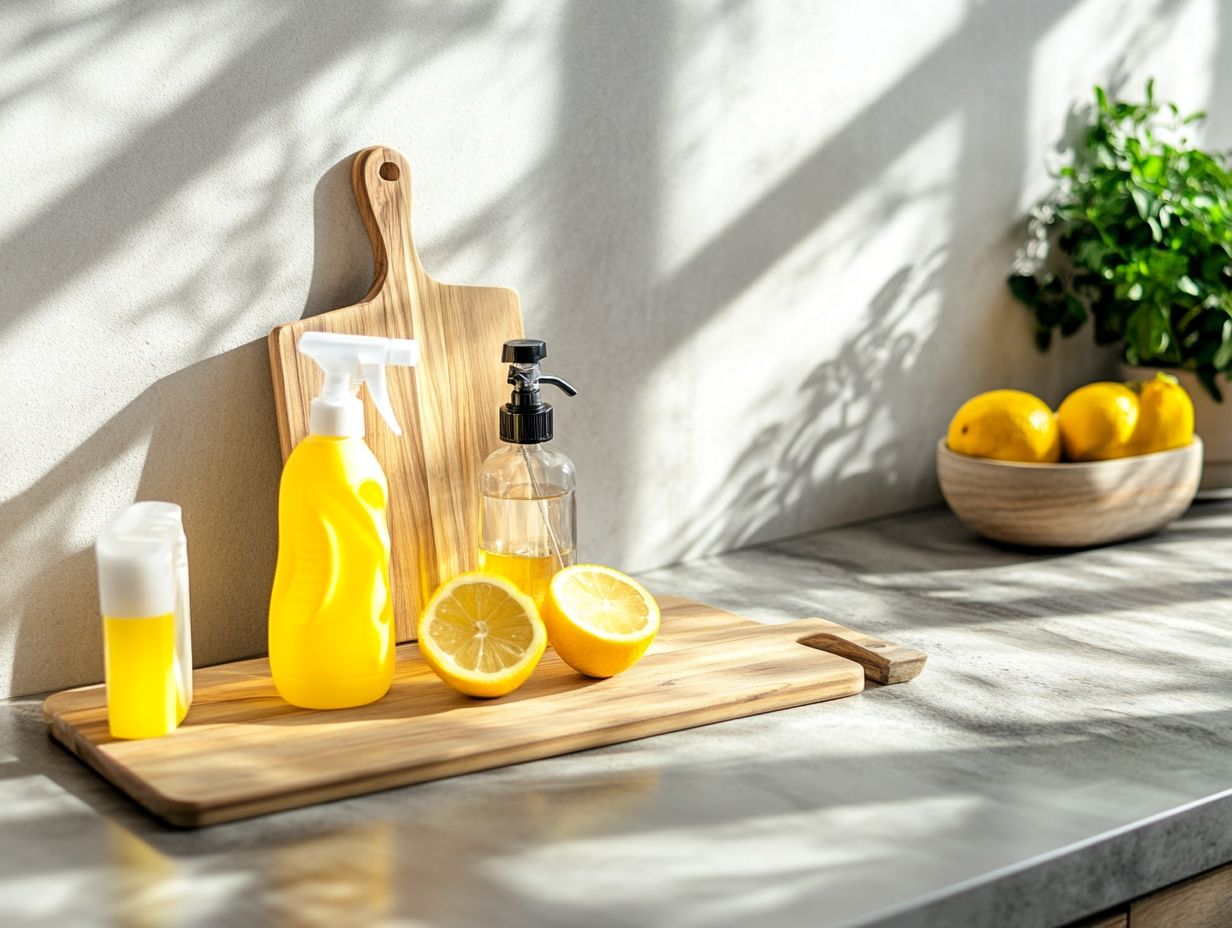
Implementing effective cleaning and maintenance techniques is essential for maintaining pristine kitchen environments. By ensuring that all surfaces and equipment are kept safe and hygienic, you create an optimal space for food preparation, safeguarding both quality and health.
Don’t wait—apply these tips today for a cleaner, safer kitchen!
Ready to elevate your kitchen’s maintenance? Get started today!
Best Practices for Cleaning and Maintaining Kitchen Materials
Adopting best practices for cleaning and maintaining your kitchen materials is crucial for promoting hygiene and extending the lifespan of your kitchen equipment and surfaces. This commitment not only ensures a safe cooking environment but also enhances the overall appearance of your kitchen.
For stainless steel, use mild dish soap and warm water. Dry with a soft cloth to prevent water spots and maintain that coveted shine.
For wooden cutting boards, a regular application of food-grade mineral oil can work wonders. This prevents cracking and warping while ensuring they remain hygienic.
Stone countertops thrive on pH-balanced cleaners that won’t harm their surface. This keeps both aesthetics and durability intact.
Regularly cleaning your surfaces and keeping everything organized contributes to a more efficient kitchen workflow. This ultimately transforms cooking into a more enjoyable experience.
Preventing Damage and Wear
Preventing damage and wear to your kitchen materials and equipment is essential for upholding safety and efficiency in your culinary operations.
By taking action, you ensure that all your tools and surfaces perform optimally over time. This allows your kitchen to function seamlessly.
Tips for Extending the Lifespan of Kitchen Materials
To extend the lifespan of your kitchen materials, it’s crucial for you to follow a well-planned maintenance schedule. Adopt effective cleaning practices tailored to each type of material.
For example, scheduling regular deep cleans can significantly boost the durability of surfaces like granite and quartz. This helps keep grime and staining agents at bay. Using pH-balanced cleaners specifically designed for these materials will help maintain their pristine appearance.
Incorporating simple routines, such as routinely checking for worn-out seals on appliances, can save you from further damage down the line. Promptly addressing any repair needs is essential.
You might also want to create a calendar to remind yourself to inspect and maintain various items. This ensures that everything from cabinets to countertops receives the attention it needs for lasting performance.
Addressing Common Issues
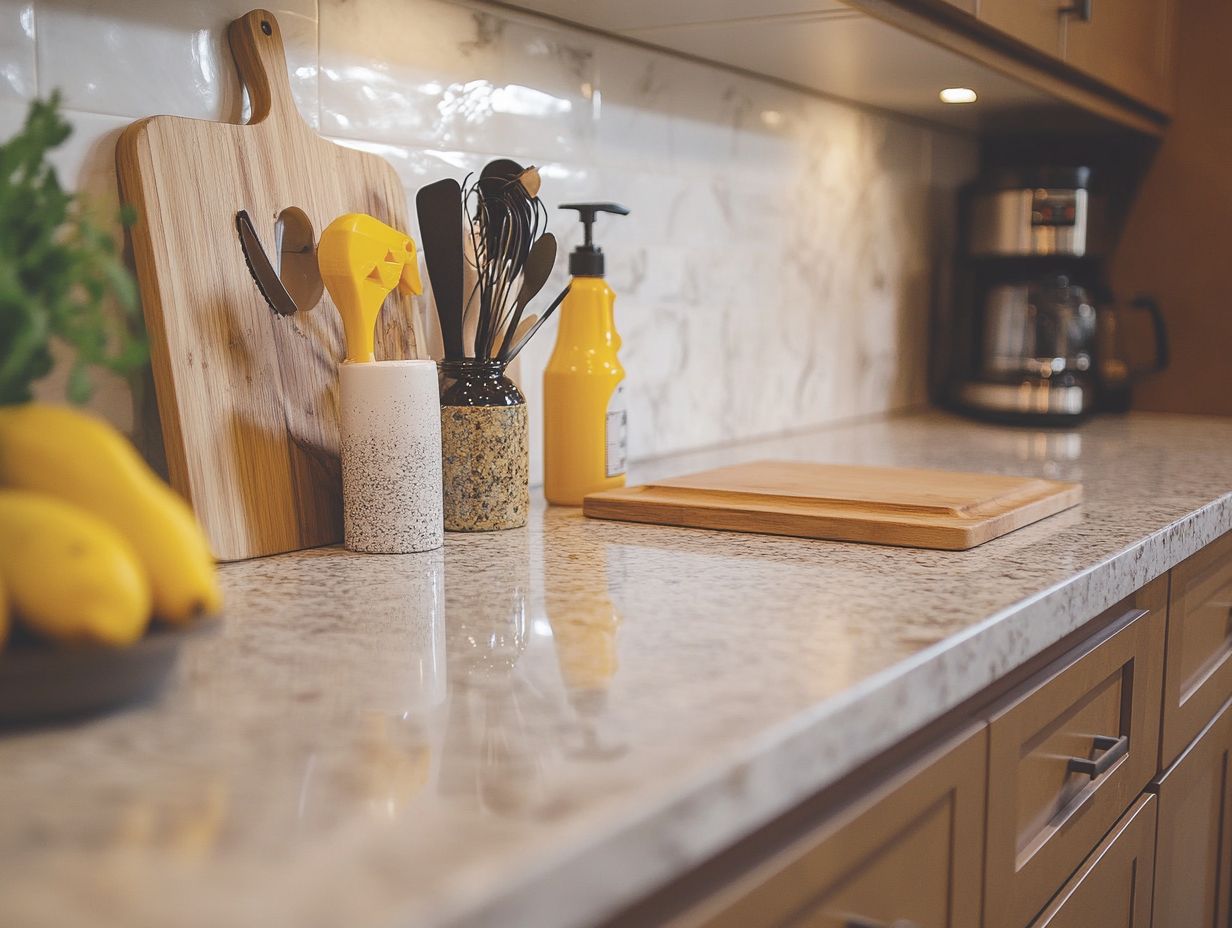
Addressing common issues like scratches and stains on kitchen surfaces is essential for preserving both the aesthetic appeal and functional integrity of your kitchen.
By taking care of these details, you enhance the overall atmosphere while ensuring your space remains practical and inviting.
How to Handle Scratches, Stains, and Other Problems
Handling scratches, stains, and other nuisances in your kitchen effectively can truly elevate the aesthetic and functionality of your surfaces and tools.
By employing specific cleaning techniques tailored to various materials, you can rejuvenate countertops, cabinetry, and appliances with ease.
For instance, a simple mixture of baking soda and water can gently buff out minor scratches on laminate surfaces. A paste of toothpaste works wonders on stainless steel. For granite or quartz countertops, a soft cloth dampened with mild soap and warm water is often all you need to lift stains.
And don’t forget about your glass surfaces; a vinegar-water solution not only cleans but adds a brilliant shine as well.
Understanding these methods gives you the power to maintain your kitchen’s beauty while prolonging the lifespan of your essential tools.
Professional Maintenance Services
By utilizing professional maintenance services, you can significantly elevate the upkeep of your commercial kitchen. This not only ensures that your kitchen operations run smoothly and efficiently but also guarantees adherence to stringent safety standards.
Take charge of your kitchen maintenance today for a cleaner, more efficient cooking space!
When to Hire a Professional and What to Expect
Wondering when to call in the experts for your kitchen? Making the right choice can transform your space!
Knowing when to hire a professional for kitchen maintenance is essential for ensuring that all cleaning and upkeep tasks are performed to the highest standards.
This decision greatly impacts the longevity of your appliances and the overall aesthetics of your kitchen. Consider enlisting cleaning services after significant renovations, during a deep clean, or when grime becomes too overwhelming.
You can expect various costs based on the services you need. However, investing in expert help can yield impressive results that boost cleanliness and contribute to disease prevention.
By hiring skilled professionals, you gain access to specialized expertise and advanced cleaning solutions tailored specifically for kitchen environments. This leads to a healthier space, fostering culinary creativity and inspiration.
Frequently Asked Questions
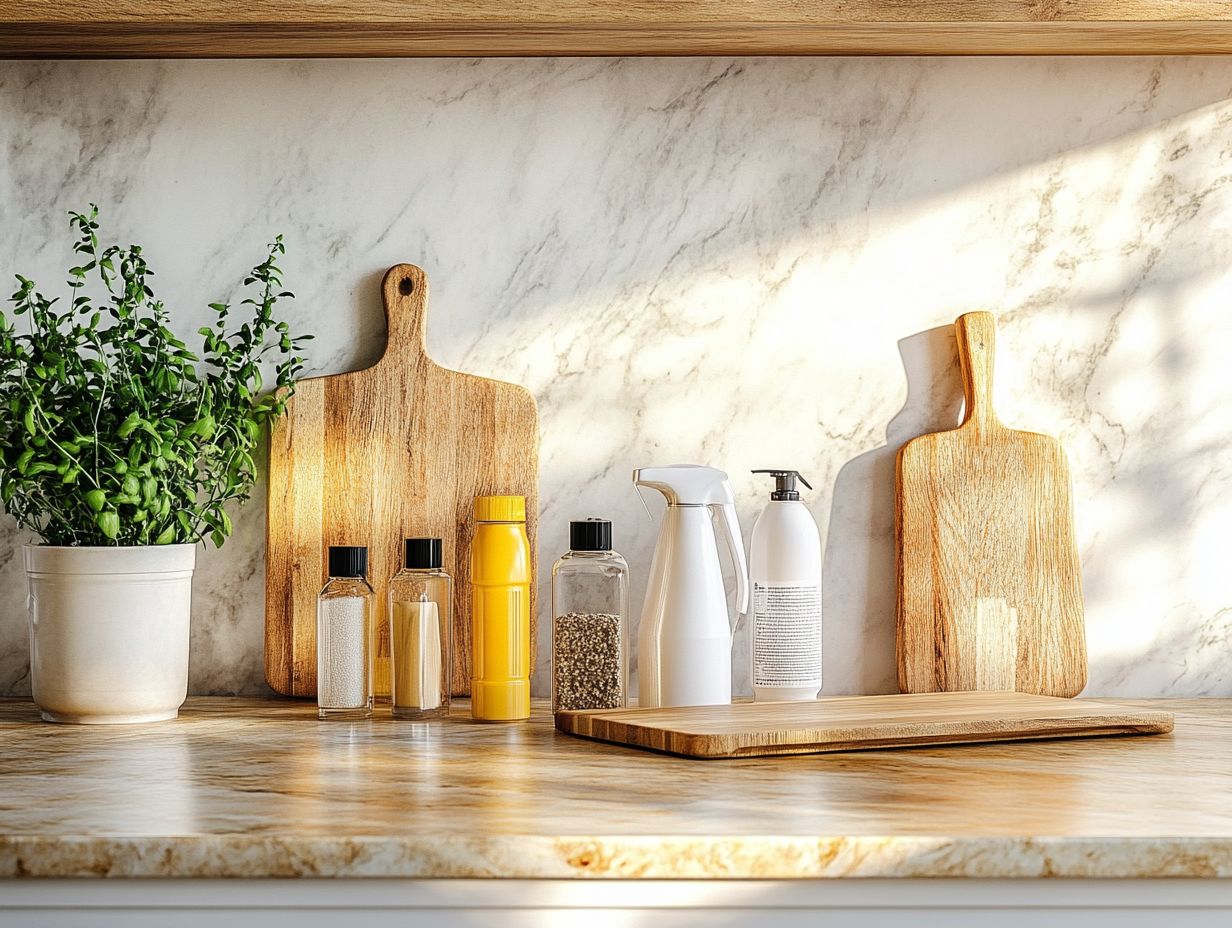
What are the different types of kitchen materials?
The most commonly used kitchen materials include wood, stainless steel, granite, quartz, marble, and tile.
Why is it important to understand kitchen material maintenance requirements?
Understanding maintenance requirements for your kitchen materials can help make them last longer, prevent damage, and maintain their appearance.
What are some general maintenance tips for kitchen materials?
To keep your kitchen materials in good condition, clean them regularly with appropriate cleaning products. Avoid harsh chemicals and handle them with care.
How often should I clean my kitchen materials?
The frequency of cleaning your kitchen materials depends on the type of material and how often you use the kitchen. Generally, clean them at least once a week.
What are some common maintenance issues with kitchen materials?
Common maintenance issues include scratches, stains, and water damage. These can usually be prevented by following proper maintenance guidelines and addressing any issues promptly.
What are some specific maintenance requirements for different types of kitchen materials?
Wood materials may require periodic polishing or sealing, which is the process of applying a protective finish. Stainless steel needs to be wiped down with a soft cloth, while granite and marble may require sealing every few years. Research the specific maintenance requirements for your chosen kitchen materials.
